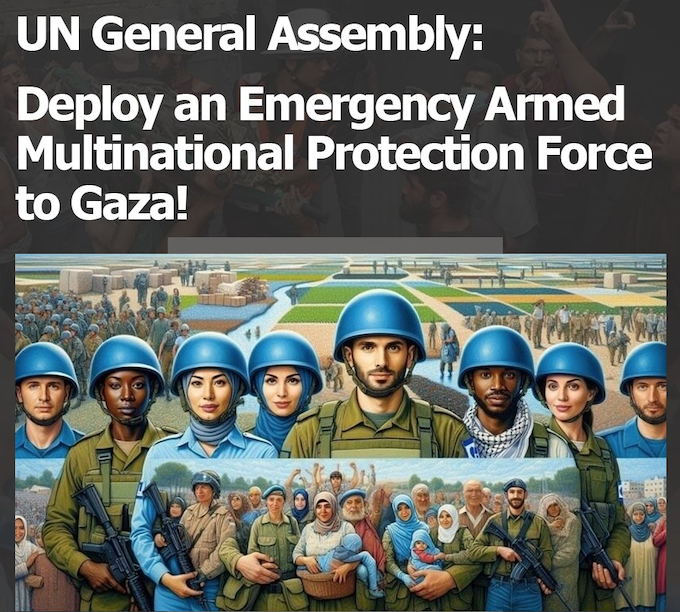COMMENTARY: By Bruce King
Almost two months ago, a UN special rapporteur, Dr Michael Fakhri, penned an opinion article in The Guardian newspaper warning that “if aid doesn’t enter Gaza now, 14,000 babies may die.”
“UN peacekeepers must step in,” he added.
Dr Fakhri is the UN Special Rapporteur for the Right to Food and an associate professor of international law at the University of Oregon.
- READ MORE: Israel bombs Gaza, Lebanon and Syria as settlers attack West Bank village
- Other Israeli war on Gaza reports
His article came 15 days after a long list of UN experts — including Dr Fakhri and beginning with the outspoken Special Rapporteur on the occupied Palestinian territories, Francesca Albanese — published an extraordinary joint statement declaring: “End unfolding genocide or watch it end life in Gaza: UN experts say States face defining choice.”
The joint statement said humanity was descending into “a moral abyss”, and Dr Fakhri decried the response so far of nations as “slow and ghastly”.
On the other hand, he praised the individuals who “mobilise and enforce international law through their own hands”, particularly the Gaza Freedom Flotillas and the land marchers attempting to reach the Rafah crossing from Egypt to Gaza.
Dr Fakhri appears to consider the deployment by the UN General Assembly of UN Peacekeepers as the only feasible option that is practical and also fast enough and vigorous enough to properly address the gravity of the situation in Gaza.
Many others have expressed similar sentiments. For instance, just days after The Guardian article, Ireland’s Labour Party asked the Irish government “to use every lever at its disposal to allow humanitarian aid into Gaza through a UN-mandated peacekeeping force”.
Dr Fakhri makes his case for UN peacekeepers action. Video: Badil Resource Centre
As another example, DAWN, a group promoting democracy and human rights in the Middle East and North Africa has long advocated for UN Peacekeepers for Gaza and has just started a petition.
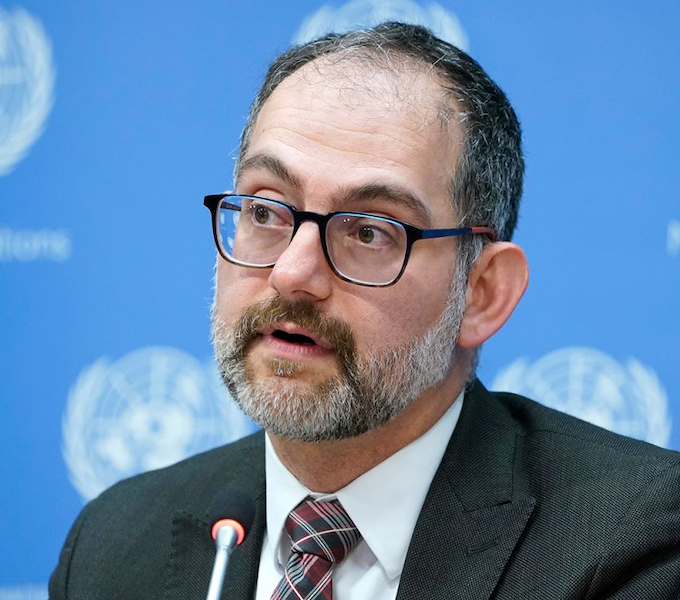
DAWN’s petition may have been timed to influence the “emergency summit”
on the crisis being held today and tomorrow in Bogota, Colombia. It is co-hosted by Colombia and South Africa and will be attended by representatives from more than 30 nations and prominent actors such as Albanese.
A crucial point is that Dr Fakhri and others have explained how the UN General Assembly can rapidly deploy a UN Peacekeeping Force for this purpose. This is important because of the widespread, but erroneous, belief that only the UN Security Council — the UN’s other main legislative organ — can authorise UN peacekeeping missions.
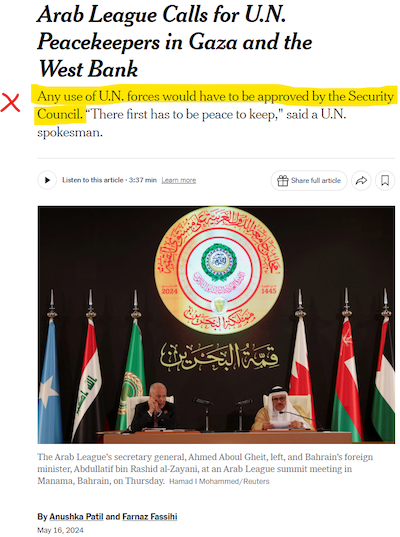
An example of this falsehood being spread by the corporate news media is shown by this New York Times claim.
Whereas all UN member states are equally represented in the General Assembly, the Security Council is dominated by its five permanent members — the United States, China, Russia, Britain, and France — with each having the power to veto all proposals.
But the US is actively supporting Israel’s activities in occupied Palestine, and it would surely block any such peacekeeping initiative if submitted to the Security Council. This leaves it up to the UN General Assembly to organise any UN Peacekeeping Force for Gaza.
As indicated by Dr Fakri, the founding UN Charter of 1945 provides for the General Assembly to step in to restore peace where the Security Council has failed in its primary responsibility to act.
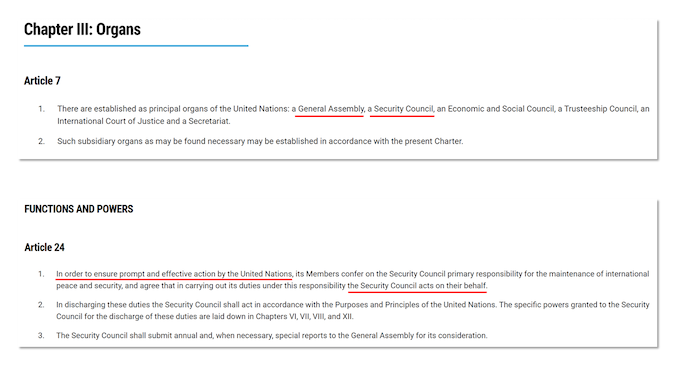
As shown above, primary responsibility was given to the Security Council under the UN Charter for practical reasons only, “to ensure prompt and effective action”.
Formal protocols for the General Assembly to take over from the Security Council were added in 1950, in what is widely referred to as the “Uniting for Peace” resolution. It explicitly provides the option of setting up an armed force, as shown below.
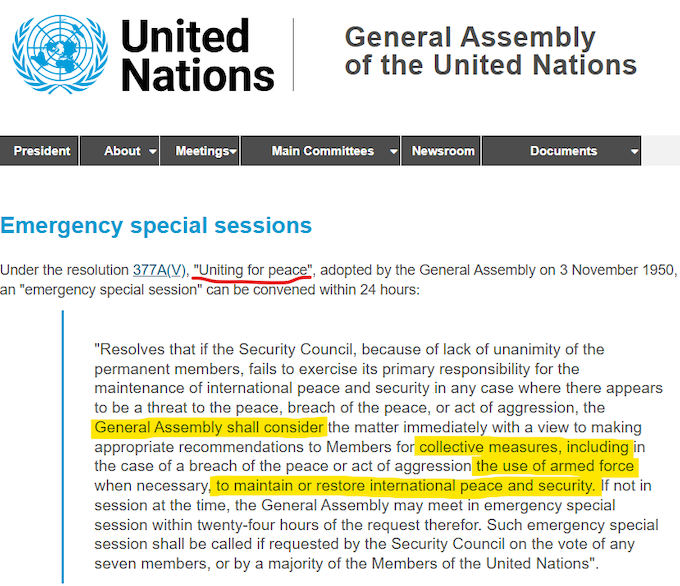
As also shown, Uniting for Peace resolutions are addressed in Emergency Special Sessions of the UN General Assembly. These can be called within 24 hours and from a request by any member state. To be passed, a resolution requires a two-thirds majority of the states that voted either for, or against, the resolution.
Historically, the very first UN Peacekeeping force was set up in this way in response to the Suez Crisis of 1956-7 — see below. Those UN Peacekeepers oversaw the prompt retreat from Egypt of Israel and of the Security Council permanent members, Britain and France. Eventually, in 1957 they were present for Israel’s withdrawal from Gaza itself, then a protectorate of Egypt.
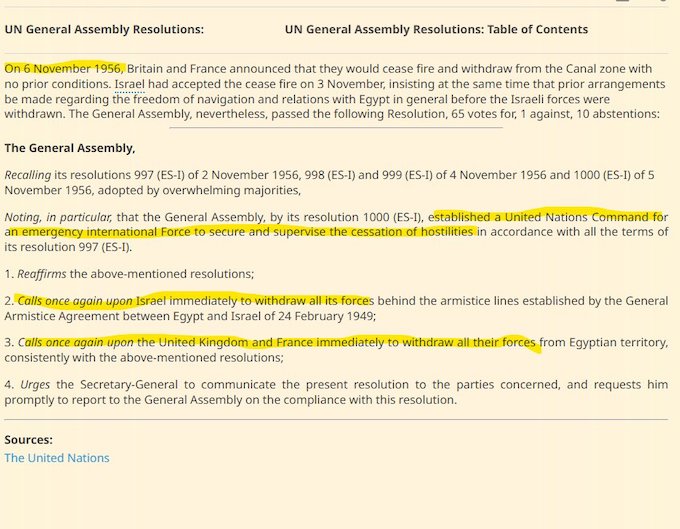
Returning to the current circumstances, Dr Fakhri says that if a UN peacekeeping force is formed then Israel’s permission is not required for its deployment in Gaza.
The actual main impediment to the success of the plan may come from covert bullying of UN member nations by the US and Israel. As explained by prominent law professor Francis Boyle: “The US government will bribe, threaten, intimidate and blackmail all members of the UN General Assembly not to [act against] Israel.”
Dr King is a physicist researching topics in renewable energy, with an interest in humanitarian issues.







